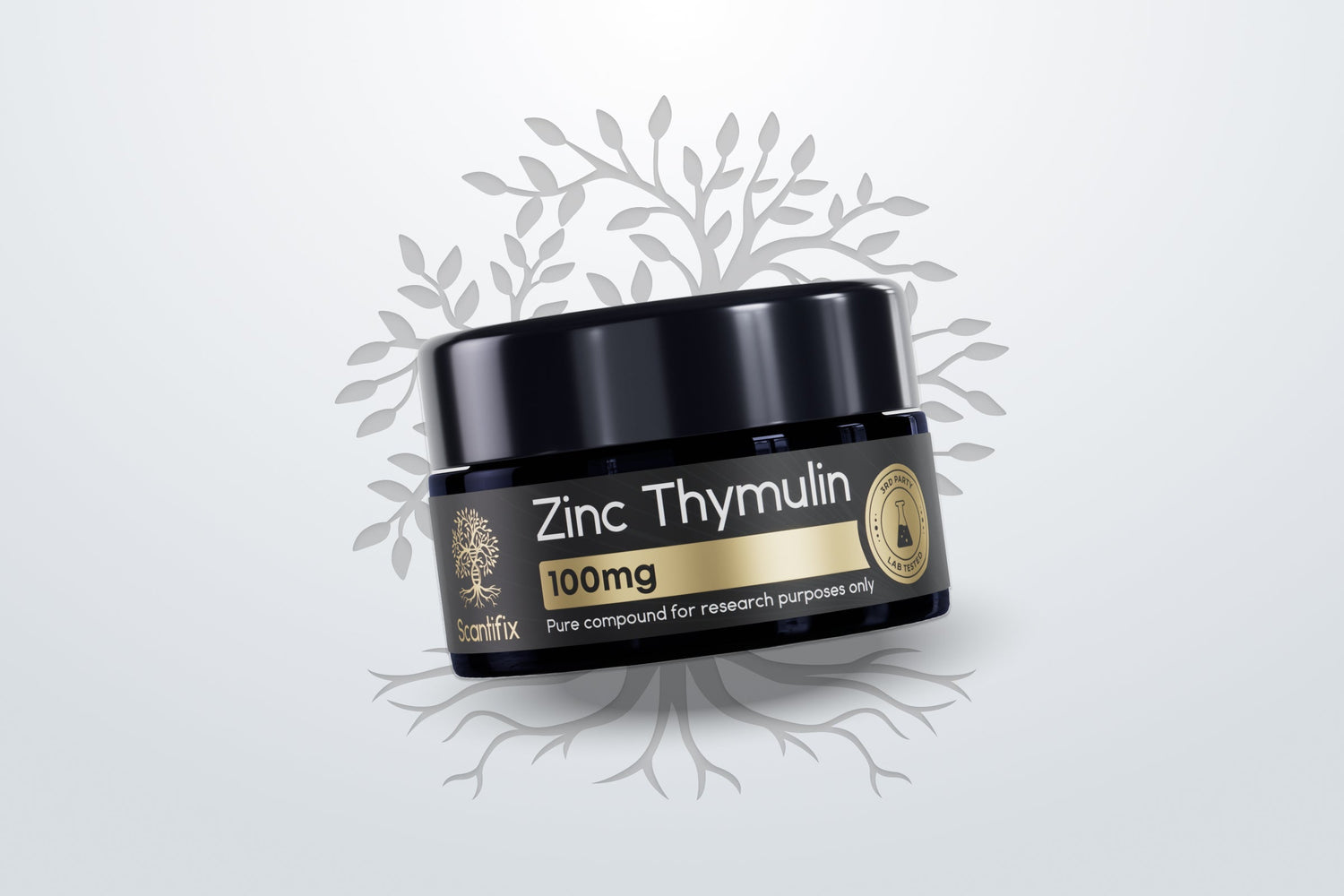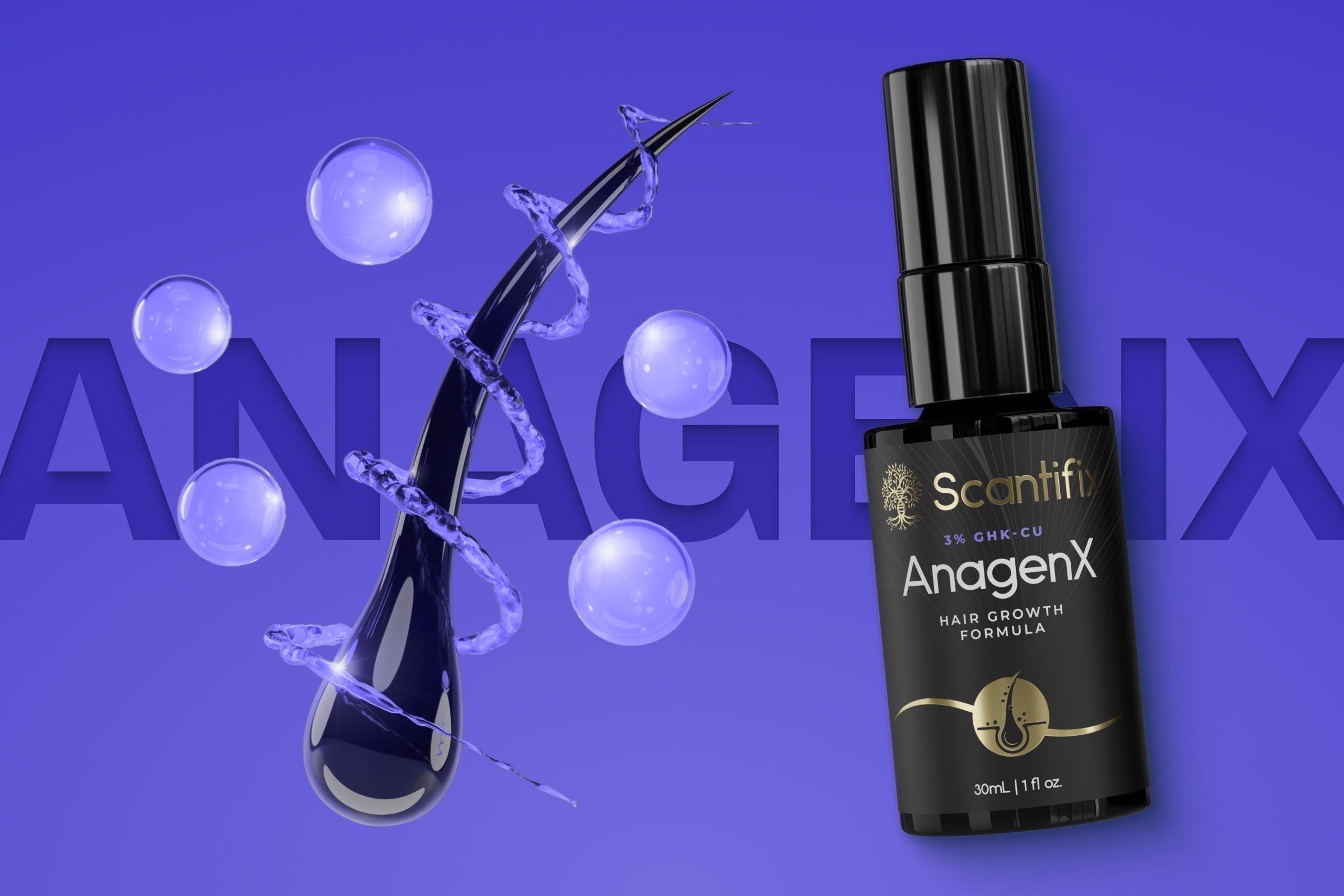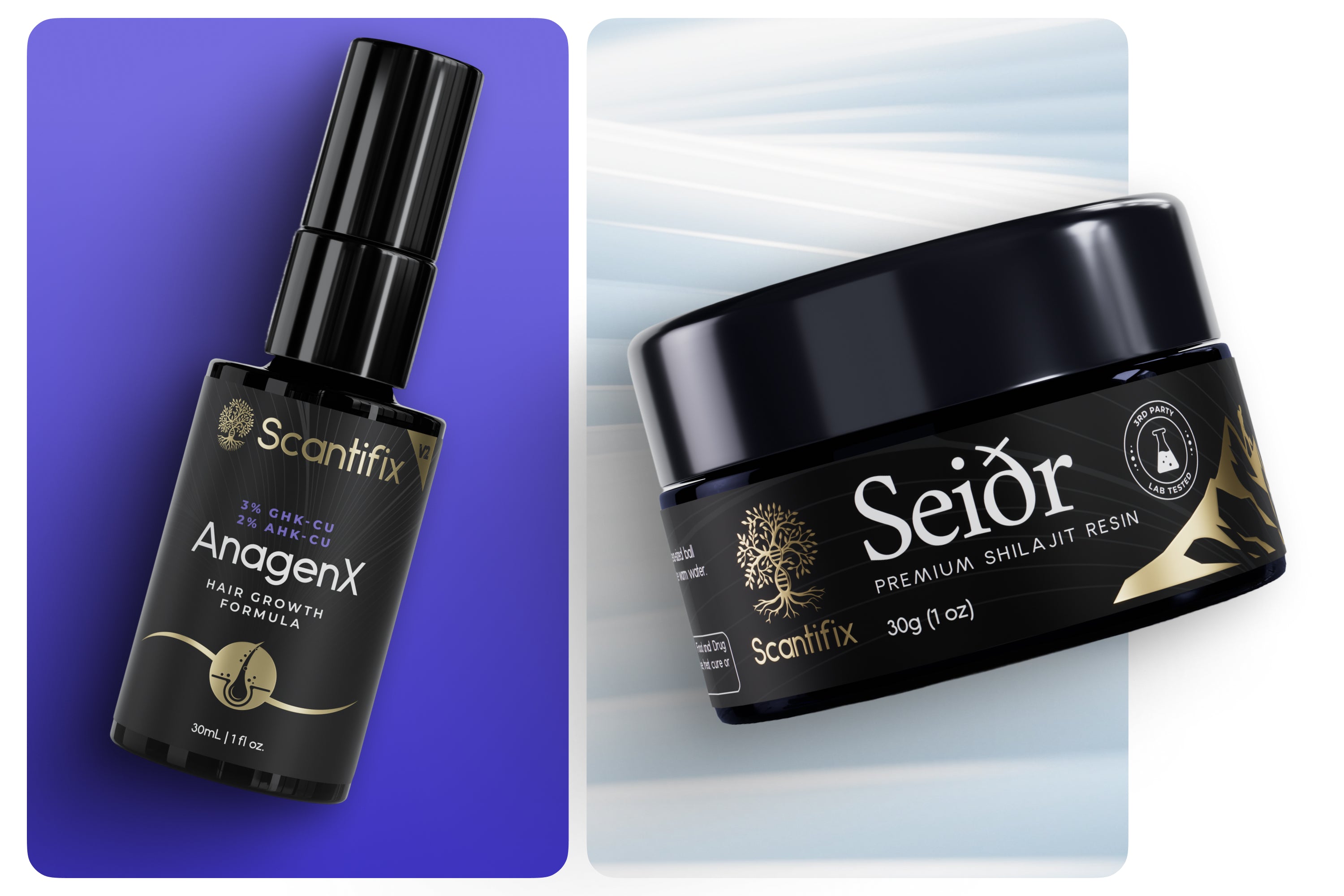Hair loss. Two words, infinite emotions. For some, it begins as a slow recession. For others, it's a shedding storm that doesn't let up. And yet, despite its universal impact, the solutions that dominate the market often feel like a Faustian bargain: regrow some strands, but disrupt your hormones? No thanks.
Within peptide research and development, there's growing momentum around safe, health-conscious alternatives. GHK-Cu has a solid track record in hair regeneration, but Zinc Thymulin is carving out its own lane — showing promising effects on follicle activity.
What is Zinc Thymulin
First of all, this is not a case of the peptide acting alone. Zinc Thymulin is a bioactive peptide-mineral complex, essentially combining the Thymulin peptide (a nonapeptide originally isolated from the thymus gland) with a zinc ion, which is required to activate its biological function. On its own, Thymulin is like an engine without fuel. But pair it with zinc, and you have a biologically competent molecule that can interact with cells in the scalp, making it particularly useful in dermatological and hair-growth applications.
How does Zinc Thymulin work
The mechanism of action behind Zinc Thymulin lies in its ability to modulate inflammatory pathways and enhance cell signaling at the follicular level. This is significant because inflammation and disrupted signaling are two of the primary drivers of hair loss, particularly in chronic conditions like androgenetic alopecia.
Zinc Thymulin downregulates pro-inflammatory cytokines, the ones that silently attack hair follicles and create a hostile growth environment. At the same time, it supports the proliferation of dermal papilla cells and hair follicle stem cells. In other words, it doesn’t just block damage, it activates the repair process too.
Zinc Thymulin also promotes the anagen phase (the active growth stage of hair follicles), potentially delaying or even reversing follicular miniaturization — the progressive shrinking that occurs when DHT wreaks havoc on the scalp.
What’s most exciting is that all of this happens without systemic side effects. No hormone manipulation. No libido changes. Just molecular harmony, delivered topically.
Zinc Thymulin hair benefits
Here’s the crux: if your hair follicles are damaged, dormant, or miniaturized, you’re not growing anything. It’s that simple. Follicles are the launch pads, and Zinc Thymulin peptide operates at this cellular level, nudging them back into activity.
This method supports both men and women. Whether you're in your 20s with a receding hairline or a 40-something woman noticing thinning at the crown, the follicular game is the same. If you’re dealing with androgenetic alopecia, which is the most common form of hair loss, Zinc Thymulin could very well be your follicle’s best friend.
Zinc Thymulin products
The peptide boom has sparked a flood of innovation. Zinc Thymulin is no exception, with multiple formulations entering the market, each suited for different users and goals. Here's the landscape:
Raw peptide Zinc Thymulin
For researchers and the DIY formulation crowd, raw Zinc Thymulin peptide is the ultimate playground. Pair it with hyaluronic acid (HA) to enhance skin penetration, and combine it with GHK-Cu to create a potent Zinc Thymulin GHK Cu serum that supports both follicle repair and scalp rejuvenation.
This blend delivers on multiple fronts: Zinc Thymulin reduces inflammation and revives follicles, while GHK-Cu promotes collagen production and angiogenesis. Together, they elevate the entire scalp ecosystem.
Sound good? We’ve made it easy for you to buy Zinc Thymulin from our store — just click here.
Zinc Thymulin spray
Topical peptide Zinc Thymulin sprays are the easiest entry point. Pre-diluted, stable, and ready to apply once or twice a day. It’s the plug-and-play option, great for consistency and hassle-free integration into a morning or night routine.
Cons? May contain stabilizers or preservatives depending on the formula, which can reduce the potential benefits.
Zinc Thymulin foam
The foam format is gaining traction, especially for folks with longer or thicker hair who want better scalp contact. It absorbs quickly, doesn’t drip, and can be used on the go. A foam can also offer better penetration in certain vehicle formulations, depending on the carrier and emollients used.
But again, it’s hard to find in pure formulations and can be more expensive than sprays.
Best Zinc Thymulin
If it isn’t obvious yet, purity matters. A lot. You don't want peptides that are diluted with unnecessary fillers, preservatives, or stabilizers that kill their activity. The cleaner your ingredients, the better your results. Especially with peptides, where even a 1% impurity can compromise bioavailability or irritate the skin. If you’re serious about your routine, this is where quality truly separates the gimmicks from the good stuff.
Our raw Zinc Thymulin is 99.52% pure, verified by third-party COA, and comes in Miron violet glass — the kind of packaging used for high-end photonic-sensitive actives.
Zinc Thymulin vs GHK-Cu
These peptides are distinct in function, but complementary in effect. Used together, particularly in a serum or stacked routine, they give dormant follicles a real chance to recover and stay strong.
Zinc Thymulin focuses on restoring balance at the follicular level. It regulates inflammatory markers, supports the anagen phase of the hair cycle, and creates the biochemical conditions needed for follicles to recover from miniaturization. It’s less about surface regeneration and more about signaling and stability deep in the skin’s microenvironment.
GHK Cu, on the other hand, is a known tissue remodeling agent. It boosts collagen, improves blood flow, and supports angiogenesis, all essential for maintaining the extracellular matrix that anchors healthy follicles. It also acts as an antioxidant, protecting scalp tissue from oxidative stress, which is another silent disruptor of hair growth.
What the data shows
While we’re still uncovering the full potential of Zinc Thymulin in clinical applications, early results are already compelling.
A clinical study has shown that Zinc Thymulin increased vellus hair count by 32% and intermediate hair count by 23% after consistent topical use, primarily in subjects with androgenetic alopecia.
Final thoughts
Hair loss goes way beyond a cosmetic issue. It’s also an emotional one. A biological one. And for once, we have something that respects all three layers, thanks to a deep understanding of follicular mechanisms.
So whether you’re rebuilding confidence, restoring your edges, or simply curious about what’s next in regenerative science—remember the name: Zinc Thymulin.
Sometimes, the smallest molecules make the biggest difference.

|
 |
 |
References
- Vickers, P. G., Wen, H., Liang, J., & Vickers, E. R. (2017). An analysis of the safety and efficacy of topical zinc‑thymulin to treat androgenetic alopecia. Hair Therapy & Transplantation, 7(1), 147. https://doi.org/10.4172/2167-0951.1000147
-
Pickart, L., & Margolina, A. (2018). Regenerative and protective actions of the GHK‑Cu peptide in the light of the new gene data. International Journal of Molecular Sciences, 19(7), 1966. https://doi.org/10.3390/ijms19071966
-
Meier, N., Langan, D., Hilbig, H., Bodó, E., Farjo, N. P., Farjo, B., Armbruster, F. P., & Paus, R. (2012). Thymic peptides differentially modulate human hair follicle growth. Journal of Investigative Dermatology, 132(5), 1516–1519. https://doi.org/10.1038/jid.2012.2
-
Kazempour, M. R., & Ghyasvand, Y. (2013). Serum zinc levels in patients with alopecia areata, androgenetic alopecia, and telogen effluvium: a comparative study. Journal of Dermatological Treatment, 24(1), 34–38. https://doi.org/10.3109/09546634.2011.648744
- Roohani, N., Hurrell, R. F., Kelishadi, R., & Schulin, R. (2013). Zinc and its importance for human health: An integrative review. Journal of Research in Medical Sciences, 18(2), 144–157.





Leave a comment
All comments are moderated before being published.
This site is protected by hCaptcha and the hCaptcha Privacy Policy and Terms of Service apply.